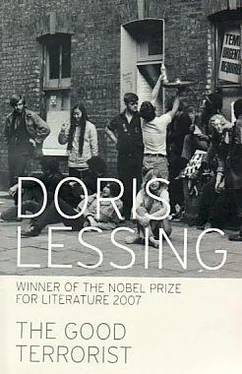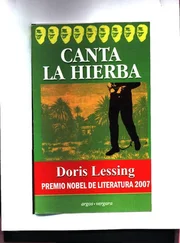She walked firmly up the path, prepared to be examined by whoever was there and was interested. She knocked. She waited a goodish time for the door to open. She caught a glimpse of the hall, the twin of theirs, but it was stacked with cartons and cases. There was a single electric bulb. So they did have electricity.
In front of her was a man who impressed her at once as being foreign. It was not anything specific in his looks; it was just something about him. He was a Russian, she knew. This gave her a little frisson of satisfaction. It was power, the idea of it, that was exciting her. The man himself was in no way out of the ordinary, being broad - not fat, though he could easily be - and not tall; in fact not much taller than herself. He had a broad, blunt sort of face, and little shrewd grey eyes. He wore grey twill trousers that looked expensive and new, and a grey bush shirt that was buttoned and neat.
He could have been a soldier.
"I am Alice Mellings. From next door."
He nodded, unsmiling, and said, "Of course. Come in." He led the way through the stacks of cartons into the room that in their house was the sitting room. Here it had the look of an office or a study. A table was set in the bay window; his chair had its back to the window, and that was because, Alice knew, he wanted to know who came in and out of the door; he did not want his back to it.
He sat down in this chair, and nodded to another, opposite it. Alice sat.
She was thinking, impressed: This one, he's the real thing.
He was waiting for her to say something.
The one thing she now knew she could not say was, "Have you been telling Jasper and Bert what to do?," which was what she wanted to know.
She said, "We have just got permission from the Council; we are short-term housing, you know." He nodded. "Well, we thought you should do the same. It makes life much easier, you see. And it means the police leave you alone."
He seemed to relax, sat back, pushed a packet of cigarettes towards her, lit one himself as she shook her head, sat holding a lungful of smoke, which he expelled in a single swift breath, and said, "It's up to the others. I don't live here."
Was that all he was going to say? It seemed so. Well, he had in fact said everything necessary. Alice, confused, hurried on, "There's the rubbish. You'll have to pay the dustmen...." She faltered.
He had his eyes intent on her. She knew that he was seeing everything. It was a detached, cold scrutiny. Not hostile, not unfriendly, surely? She cried, "We've been given a year. That means, once the place is straight, we can give all our attention to" - she censored "the revolution" - "politics."
He seemed not to have heard. To be waiting for more? For her to go? Floundering on, she said, "Of course not everyone in our squat... For instance, Roberta and Faye don't think that... But why should you know about them? I'll explain...."
He cut in, "I know about Roberta and Faye. Tell me, what are those two new ones like?"
She said, giving Reggie and Mary the credit due, "They were once members of Militant, but they didn't like their methods." Here she dared to offer him a smile, hoping he would return it, but he said, "She works for the Council? On what sort of level?"
"She doesn't take decisions."
He nodded. "And what about him? A chemist, I believe?"
"Industrial chemist. He lost his job."
"Where?"
"I didn't ask." She added, "I'll let you know."
He nodded. Sat smoking. Sat straight to the table, both forearms on it, in front of him a sheet of paper on which his eyes seemed to make notes. He was like Lenin!
She thought: His voice. American. Yes, but something funny for an American voice. No, it was not the voice, the accent, but something else, in him.
He didn't say anything. The question, the anxiety that were building up in her surfaced. "Jasper and Bert have gone down to Melstead. They went early."
He nodded. Reached for a neatly folded newspaper and opened it in front of him, turning the pages. "Have you seen today's Times?"
"I don't read the capitalist press."
"I think perhaps that is a pity," he commented after a pause. And pushed across the paper, indicating a paragraph.
Asked whether they welcomed these reinforcements to the picket line, Crabit, the strikers' representative, said he wished the Trotskyists and the rent-a-picket crowd would keep away. They weren't wanted. The workers could deal with things themselves.
Alice felt she could easily start crying again.
She said, "But this is a capitalist newspaper. They're just trying to split the democratic forces, they want to disunite us." She was going to add, "Can't you see that?," but could not bring it out.
He took back the paper and laid it where it had been. Now he was not looking at her.
"Comrade Alice," he said, "there are more efficient ways of doing things, you know."
He stood up. "I've got work to do." She was dismissed. He came out from behind the table and walked with her to the door and back through the hall to the front door.
"Thank you for coming to see me," he said.
She stammered, "Would there be a room in this house we could use for a... discussion. You see, some of us are not sure about... some of the others."
He said, "I'll ask." He hadn't reacted as she had feared he would. Bringing it out had sounded so feeble....
He nodded and, at last, gave her a smile. She went off in a daze. She was telling herself, But he's the real thing, he is.
He had not told her his name.
She walked along the short stretch of main road slowly, because in front of her, in the middle of the pavement, was a girl with a small child in a pushchair. The child looked like a fat plastic parcel with a pale podgy spotty face coming out of the top. He was whining on a high persistent note that set Alice's teeth on edge. The girl looked tired and desperate. She had lank unwashed-looking pale hair. Alice could see from the set angry shoulders that she wanted to hit the child. Alice was waiting to walk faster when she could turn off into her own road, but the girl turned, still in the middle of the pavement. There she stopped, looking at the houses and, in particular, at number 43. Alice went past her and in at her gate. She heard the girl say, "Do you live here? In this house?"
"Yes, I do," said Alice, without turning, in a curt voice. She knew what was coming. She walked on up the path. She heard the wheels of the pushchair crunch after her.
"Excuse me," she heard, and knew from the stubborn little voice that she could not get out of it. She turned sharply, blocking the way to the front door. Now she faced the girl squarely, with a no written all over her. This was not the first time, of course, that she had been in this position. She was feeling: It is unfair that I have to deal with this.
She was a poor thing, this girl. Probably about twenty. Already worn down with everything, and the only energy in her the irritation she was containing because of her grizzling child.
"I heard this house is short-term housing now," she said, and she kept her eyes on Alice's face. They were large, grey, rather beautiful eyes, and Alice did not want the pressure of them. She turned to the door, and opened it.
"Where did you hear that?"
The girl did not answer this. She said, "I'm going mad. I've got to have a place. I've got to find somewhere. I've got to."
Alice went into the hall, ready to shut the door, but found that the girl's foot stopped her. Alice was surprised, for she had not expected such enterprise. But her own determination was made stronger by her feeling that if the girl had that much spirit, then she wasn't in such a bad way after all.
The door stood open. The child was now weeping noisily and wholeheartedly inside his transparent shroud, his wide-open blue eyes splashing tears onto the plastic. The girl confronted Alice, who could see she was trembling with anger.
Читать дальше











